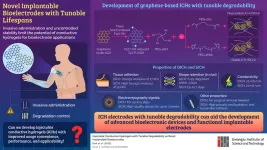(Press-News.org) One of the most important advances in palliative care in oncology over the past 15 years has been the recognition that palliative care specialists can improve cancer patients’ outcomes well before their end of life.
Palliative care is specialized care provided to individuals with a serious illness that focuses on decision-making support, pain and symptom management, as well as psychosocial interventions to improve quality of life.
Several past randomized clinical trials have shown palliative care specialists can improve the quality of life and lengthen the survival of patients receiving chemotherapy for metastatic cancer. Other randomized trials have shown palliative care benefits patients undergoing curative treatments, like bone marrow transplantation for hematologic malignancies, or cancers of the blood or blood-forming tissue.
Because of this evidence, in 2016 the American Society of Clinical Oncology recommended specialist palliative care be included along with active treatment for advanced malignancies.
Palliative care specialists and oncology surgeons from Vanderbilt University Medical Center and the VA Tennessee Valley Healthcare System have published a study in JAMA Surgery providing evidence that the addition of palliative care services earlier in the disease process, specifically to patients having surgery for cancer, does not demonstrate benefits to the patients. The study also indicates the provision of palliative care at the point of surgery does not increase the patients’ distress or harm them in any way.
“Palliative care specialists are in short supply, so we don’t want to expand the patient population for palliative care specialists without good data that they help that population,” said lead author Myrick “Ricky” Shinall Jr, MD, PhD, associate professor of Surgery and Medicine. “The study was important to test whether this further move upstream in the cancer care continuum would be a good use of a limited resource.
“Prior to the study, I could come up with an explanation of why the intervention would benefit patients since the research had been continually discovering the benefits of specialist palliative care for patients earlier and earlier in the cancer care continuum. I could also come up with the rationale that the issues patients face while undergoing cancer surgery are vastly different than what they face undergoing chemotherapy or stem cell transplant, and they therefore would have much lower levels of unmet palliative care needs and would not show much evidence of benefit from seeing palliative care specialists. It turns out the latter is the case, but we could only know that by doing the trial.”
The study was a randomized clinical trial in which 235 adults undergoing major abdominal operations for cancer were randomly assigned to either an intervention group where they received specialist palliative care or to a control group where they received usual care. The intervention group received a preoperative consultation with a board-certified palliative care physician or nurse practitioner, inpatient visits from these palliative care specialists at least twice weekly during their hospital stay, three follow-up visits or phone calls with the specialists between their hospital discharge and postoperative day 90, and an inpatient palliative care specialist visit if the patient was readmitted to the hospital.
Assessments measured physical and functional quality of life, depression, anxiety, caregiver burden and survival, and there was no evidence that a specialist palliative care intervention significantly improved outcomes. The study did show no adverse effects or additional stress to the patients who received the palliative care intervention.
“One of the concerns people had when the study started was whether incorporating palliative care specialists in perioperative care would distress the patients, and our data really don’t show any evidence of distress or harm caused by the intervention,” Shinall said. “This matches up with our personal experience delivering the palliative care intervention, which we found the patients welcomed. So, one important lesson from this study is that surgeons should not be reluctant to call for palliative care consultations based on a fear this will upset their patients.”
The study team is building on the strengths of this research and designing a new, multicenter randomized control trial (RCT) to test whether a palliative care intervention is beneficial for patients being evaluated for liver transplantation. A second multicenter RCT is also planned to test whether a consultation with geriatricians can improve the outcomes of older surgical oncology patients.
This research was funded by grants K76AG068436, R03AG060085, K12CA090625 and UL1TR002243 from the National Institutes of Health.
END
Study: palliative care provided at point of oncology surgery does not improve patient outcomes
2023-05-10
ELSE PRESS RELEASES FROM THIS DATE:
Investigating social media to evaluate emergency medicine physicians’ emotional well-being during COVID-19
2023-05-10
About The Study: In this study, key thematic shifts and increases in language related to anxiety, anger, depression, and loneliness were identified in the content posted on social media by academic emergency medicine physicians and resident physicians during the pandemic. Social media may provide a real-time and evolving landscape to evaluate thematic content and linguistics related to emotions and sentiment for health care workers.
Authors: Anish K. Agarwal, M.D., M.P.H., M.S., of the ...
Analysis of BMI in early and middle adulthood and estimated risk of gastrointestinal cancer
2023-05-10
About The Study: In this secondary analysis of the Prostate, Lung, Colorectal, and Ovarian Cancer Screening Trial, overweight and obese body mass index (BMI) in early and middle adulthood was associated with an elevated risk of colorectal cancer and non-colorectal gastrointestinal cancers. The results of the current study prompt further exploration into the mechanistic role of obese BMI in carcinogenesis.
Authors: Holli A. Loomans-Kropp, Ph.D., M.P.H., of Ohio State University in Columbus, is the corresponding author.
To access the embargoed study: Visit our For The Media website at this link https://media.jamanetwork.com/
(doi:10.1001/jamanetworkopen.2023.10002)
Editor’s ...
UW Medicine scientists among leads of NIH pangenome studies
2023-05-10
UW Medicine genome experts made significant scientific contributions to a National Institutes of Health Human Genome Research Institute reference collection that better represents the genetic diversity of the world’s populations.
Called the Human Pangenome Reference Consortium, the multi-institutional effort expands and updates earlier work that started as the Human Genome Project. That original project, with drafts reported in 2001 and 2003, was based on a more limited sampling of human DNA. The goal then was to create an entire sequence of a human genome to use as a reference. ...
The clearest snapshot of human genomic diversity ever taken
2023-05-10
For more than 20 years, scientists have relied on the human reference genome, a consensus genetic sequence, as a standard against which to compare other genetic data. Used in countless studies, the reference genome has made it possible to identify genes implicated in specific diseases and trace the evolution of human traits, among other things.
But it has always been a flawed tool. One of its biggest problems is that about 70 percent of its data came from a single man of predominantly African-European background whose DNA was sequenced during ...
Researchers measure the light emitted by a sub-Neptune planet’s atmosphere for the first time
2023-05-10
For more than a decade, astronomers have been trying to get a closer look at GJ 1214b, an exoplanet 40 light-years away from Earth. Their biggest obstacle is a thick layer of haze that blankets the planet, shielding it from the probing eyes of space telescopes and stymying efforts to study its atmosphere.
NASA’s new James Webb Space Telescope (JWST) solved that issue. The telescope’s infrared technology allows it to see planetary objects and features that were previously obscured ...
Paper refutes assertion that effects of bottom trawling on blue carbon can be compared to that of global air travel
2023-05-10
A ‘Matter Arising’ paper published in Nature today refutes the findings of a paper by Sala et al on the amount of CO2 released from the seabed by bottom trawling. The paper made significant headlines around the world on release in 2021, as it equated the carbon released by bottom trawling to be of a similar magnitude to the CO2 created by the global airline industry.
In their paper quantifying the carbon benefits of ending bottom trawling, Prof Jan Hiddink of Bangor University’s world-renowned School of Ocean Science and others, explain that the methodology ...
Gwangju Institute of Science and Technology researchers develop injectable bioelectrodes with tunable lifetimes
2023-05-10
Implantable bioelectrodes are electronic devices that can monitor or stimulate biological activity by transmitting signals to and from living biological systems. Such devices can be fabricated using various materials and techniques. But, because of their intimate contact and interactions with living tissues, selection of the right material for performance and biocompatibility is crucial. In recent times, conductible hydrogels have attracted great attention as bioelectrode materials owing to their flexibility, compatibility, and excellent interaction ability. However, the absence ...
Study of cancer metastasis, most common cause of cancer death, gets $35 million boost at Johns Hopkins Medicine
2023-05-10
FOR IMMMEDIATE RELEASE
With a $35 million gift from researcher, philanthropist and race car driver Theodore Giovanis, scientists at Johns Hopkins Medicine will study the biological roots of the most fatal aspect of cancer: how it metastasizes, or spreads, through the body.
The contribution, a 15-year commitment, will establish the Giovanis Institute for Translational Cell Biology, dedicated to studying metastasis. The institute’s researchers aim to make discoveries that reveal common features of metastasis across cancer types, ...
Pandemic stress reshapes the placentas of expectant moms
2023-05-10
WASHINGTON (May 10, 2023) – Elevated maternal stress during the COVID-19 pandemic changed the structure, texture and other qualities of the placenta in pregnant mothers – a critical connection between mothers and their unborn babies – according to new research from the Developing Brain Institute at Children’s National Hospital.
Published in Scientific Reports, the findings spotlight the underappreciated link between the mental health of pregnant mothers and the health of the placenta – a critical organ ...
Local Phoenix medical students invited to upcoming medical conference to learn about opportunities in interventional cardiology
2023-05-10
A newly piloted program from the Society for Cardiovascular Angiography & Interventions (SCAI), the leading society representing interventional cardiology, hopes to increase access and encourage interest in interventional cardiology early in students' medical careers.
SCAI's Ready to Launch - Careers in Cardiology program is designed to introduce future physicians to the field of interventional cardiology through a half-day program where attendees will get the opportunity to have impactful conversations with nationally recognized interventional cardiologists, learning about training paths, barriers to care and solutions for the future, the importance of health ...




